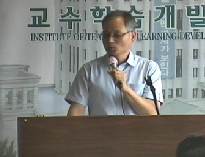The notion of analyticity, or the problem of analytic-synthetic distinction has played an important role in the development of twentieth century philosophy, including the development of analytic philosophy. Philosophers have focused intensely on this ...
http://chineseinput.net/에서 pinyin(병음)방식으로 중국어를 변환할 수 있습니다.
변환된 중국어를 복사하여 사용하시면 됩니다.
- 中文 을 입력하시려면 zhongwen을 입력하시고 space를누르시면됩니다.
- 北京 을 입력하시려면 beijing을 입력하시고 space를 누르시면 됩니다.
https://www.riss.kr/link?id=A104209983
-
저자
한상기 (전북대학교)
- 발행기관
- 학술지명
- 권호사항
-
발행연도
2010
-
작성언어
Korean
-
주제어
분석성 ; 분석-종합 구별 ; 선천적/후천적 지식 ; 흄 ; 칸트 ; 프레게 ; 비엔나 학단 ; analyticity ; the analytic-synthetic distinction ; a priori/a posteriori knowledge ; D. Hume ; I. Kant ; G. Frege ; L. Wittgenstein ; the Vienna Circle ; W. V. Quine
-
등재정보
KCI등재
-
자료형태
학술저널
-
수록면
189-214(26쪽)
-
KCI 피인용횟수
1
- 제공처
-
0
상세조회 -
0
다운로드
부가정보
다국어 초록 (Multilingual Abstract)
This paper aims at the preliminary work for understanding the reason why did Quine's attack of analytic-synthetic distinction influence on so many analytic philosophers for so long. So, it investigates origins and the development of notion of analyticity through many philosophical projects of the late modern and contemporary period, including the work of D. Hume, I. Kant, G. Frege, and the Vienna Circle. This paper attempts to highlight how individual philosopher's explanations of analyticity informed their view of the task of philosophy itself. In doing these, I believe that we can understand the reason why did Quine's attack of analytic- synthetic distinction influence on the work of analytic philosophers.
The notion of analyticity, or the problem of analytic-synthetic distinction has played an important role in the development of twentieth century philosophy, including the development of analytic philosophy. Philosophers have focused intensely on this distinction, not only because it seems important for understanding knowledge in general but also because it seems crucial for understanding the task of philosophy. As a result, the analytic-synthetic distinction was at the heart of epistemological discussions and underlay the conception of philosophy as an autonomous body of knowledge. Yet analyticity has been largely neglected for the past few decades. Why? One reason may be that a common contemporary attitude toward analyticity stems from the belief that W. V. Quine, along with others such as N. Goodman and M. White, conclusively showed that there is no such thing as analytic statement, or that if there is such a thing, it is of no philosophical relevance.
This paper aims at the preliminary work for understanding the reason why did Quine's attack of analytic-synthetic distinction influence on so many analytic philosophers for so long. So, it investigates origins and the development of notion of analyticity through many philosophical projects of the late modern and contemporary period, including the work of D. Hume, I. Kant, G. Frege, and the Vienna Circle. This paper attempts to highlight how individual philosopher's explanations of analyticity informed their view of the task of philosophy itself. In doing these, I believe that we can understand the reason why did Quine's attack of analytic- synthetic distinction influence on the work of analytic philosophers.
국문 초록 (Abstract)
이 논문은 20세기 중반에 분석성에 대한 콰인의 공격이 왜 그렇게 큰 영향을 미치게 되었는지를 이해하기 위한 기초 작업이라고 할 수 있다. 그러한 이해를 위해 이 논문은 근대에서 20세기에 이르기까지 여러 철학자에게서 나타나는 분석성 개념의 기원과 발전과정을 통해 이른바 분석성 문제의 본질을 밝히고, 분석성 개념이 철학의 임무를 규정하는 데 어떻게 역할을 해왔는지 조명하고자 한다. 그래서 흄, 칸트, 프레게, 논리 실증주의 등에게서 나타나는 분석성 개념의 역사를 밝히면서, 각 철학자들의 분석성 개념이 이들 철학자들의 철학관을 어떻게 형성시켰는지 지적할 것이다. 그러고 나면 분석성에 대한 콰인의 공격이 왜 그렇게 큰 영향을 미치게 되었는지도 어느 정도 자연스럽게 이해될 것이라고 생각한다.
분석성 개념, 그리고 그와 연관된 분석-종합 구별 문제는 20세기 철학, 특히 분석철학의 발전 과정에서 핵심적 역할을 해왔다. 그래서 분석성 개념과 분석-종합 구별은 인식론적 토론의 핵심 ...
분석성 개념, 그리고 그와 연관된 분석-종합 구별 문제는 20세기 철학, 특히 분석철학의 발전 과정에서 핵심적 역할을 해왔다. 그래서 분석성 개념과 분석-종합 구별은 인식론적 토론의 핵심 주제가 되었고, 자율적 학문으로서의 철학 개념의 기초가 되었다. 그런데도 20세기 후반부터 분석성 개념은 대체로 무시되거나 경시되었다. 분석성 무시라는 이러한 오늘날의 태도는 콰인을 비롯한 몇몇 철학자가 분석적 진리 같은 것은 없다거나, 그런 것이 있다 해도 철학적 중요성이 없다는 것을 결정적으로 증명했다는 믿음에서 유래한다.
이 논문은 20세기 중반에 분석성에 대한 콰인의 공격이 왜 그렇게 큰 영향을 미치게 되었는지를 이해하기 위한 기초 작업이라고 할 수 있다. 그러한 이해를 위해 이 논문은 근대에서 20세기에 이르기까지 여러 철학자에게서 나타나는 분석성 개념의 기원과 발전과정을 통해 이른바 분석성 문제의 본질을 밝히고, 분석성 개념이 철학의 임무를 규정하는 데 어떻게 역할을 해왔는지 조명하고자 한다. 그래서 흄, 칸트, 프레게, 논리 실증주의 등에게서 나타나는 분석성 개념의 역사를 밝히면서, 각 철학자들의 분석성 개념이 이들 철학자들의 철학관을 어떻게 형성시켰는지 지적할 것이다. 그러고 나면 분석성에 대한 콰인의 공격이 왜 그렇게 큰 영향을 미치게 되었는지도 어느 정도 자연스럽게 이해될 것이라고 생각한다.
참고문헌 (Reference)
1 Gutting,G, "What Philosophers Know: Case Studies in Recent Analytic Philosophy" Cambridge University Press 2009
2 Quine,W.V.O, "Two Dogmas of Empiricism. In: From a Logical Point of View, 2nd ed" Harper 1961
3 Wittgenstein,L, "Tractatus Logico-Philosophicus" Routledge and Kegan Paul 1986
4 Frege,G, "The Foundation of Arithmetic: A Logico- Mathematical Inquiry into the Concept of Number" Blackwell 1974
5 Frege, G, "The Basic Laws of Arithmetic" University of California Press 1964
6 Glock,H.J, "Quine and Davidson on Thought, Language and Reality" Cambridge University Press 2003
7 Burge,T, "Philosophy of Language and Mind: 1950-1990" 101 : 1992
8 Schlick,M, "General Theory of Knowledge" Open Court 1985
9 Lycan,W, "Definition in a Quinean World. In: Definitions and Definability: Philosophical Perspectives" Kluwer 1991
10 Kant,I, "Critique of Pure Reason" St. Martin’s Press 1965
1 Gutting,G, "What Philosophers Know: Case Studies in Recent Analytic Philosophy" Cambridge University Press 2009
2 Quine,W.V.O, "Two Dogmas of Empiricism. In: From a Logical Point of View, 2nd ed" Harper 1961
3 Wittgenstein,L, "Tractatus Logico-Philosophicus" Routledge and Kegan Paul 1986
4 Frege,G, "The Foundation of Arithmetic: A Logico- Mathematical Inquiry into the Concept of Number" Blackwell 1974
5 Frege, G, "The Basic Laws of Arithmetic" University of California Press 1964
6 Glock,H.J, "Quine and Davidson on Thought, Language and Reality" Cambridge University Press 2003
7 Burge,T, "Philosophy of Language and Mind: 1950-1990" 101 : 1992
8 Schlick,M, "General Theory of Knowledge" Open Court 1985
9 Lycan,W, "Definition in a Quinean World. In: Definitions and Definability: Philosophical Perspectives" Kluwer 1991
10 Kant,I, "Critique of Pure Reason" St. Martin’s Press 1965
11 "Chronicle of Higher Education, “An Imaginative Philosopher: the Legacy of W. V. Quine”(obituary notice)"
12 Juhl, C, "Analyticity" Routledge 2010
13 Steup,M, "An Introduction to Contemporary Epistemology" Prentice Hall Inc 1996
14 Hume,D, "An Inquiry Concerning Human Understanding and Concerning the Principles of Morals" Clarendon Press 1988
15 Hume,D, "A Treastise of Human Nature, 2nd ed" Clarenden Press 1978
동일학술지(권/호) 다른 논문
-
- 범한철학회
- 김요한
- 2010
- KCI등재
-
- 범한철학회
- 장수
- 2010
- KCI등재
-
- 범한철학회
- 김한승
- 2010
- KCI등재
-
- 범한철학회
- 조관성
- 2010
- KCI등재
분석정보
인용정보 인용지수 설명보기
학술지 이력
| 연월일 | 이력구분 | 이력상세 | 등재구분 |
|---|---|---|---|
| 2026 | 평가예정 | 재인증평가 신청대상 (재인증) | |
| 2020-01-01 | 평가 | 등재학술지 유지 (재인증) |  |
| 2017-01-01 | 평가 | 등재학술지 유지 (계속평가) |  |
| 2013-01-01 | 평가 | 등재학술지 유지 (등재유지) |  |
| 2010-01-01 | 평가 | 등재학술지 유지 (등재유지) |  |
| 2008-01-01 | 평가 | 등재학술지 유지 (등재유지) |  |
| 2005-01-01 | 평가 | 등재학술지 선정 (등재후보2차) |  |
| 2004-01-01 | 평가 | 등재후보 1차 PASS (등재후보1차) |  |
| 2003-01-01 | 평가 | 등재후보학술지 선정 (신규평가) |  |
학술지 인용정보
| 기준연도 | WOS-KCI 통합IF(2년) | KCIF(2년) | KCIF(3년) |
|---|---|---|---|
| 2016 | 0.53 | 0.53 | 0.5 |
| KCIF(4년) | KCIF(5년) | 중심성지수(3년) | 즉시성지수 |
| 0.51 | 0.47 | 1.284 | 0.12 |




 KCI
KCI eArticle
eArticle






